An electrical service upgrade increases your home's electrical capacity by replacing the main electrical panel, service entrance cable, and meter base to handle higher amperage demands from modern appliances and technology.
Quick Answer: What is an Electrical Service Upgrade?
While 100-amp panels were once standard, today's energy demands often make them obsolete. Families now use more power than older properties can handle, with everything from electric vehicle chargers to high-efficiency heat pumps requiring substantial electrical capacity.
Your home's electrical panel may be working harder than it was ever designed to. As we move toward an all-electric future with smart homes and efficient heating systems, your electrical service needs to keep pace.
Modern electrical demands that often trigger upgrades include:
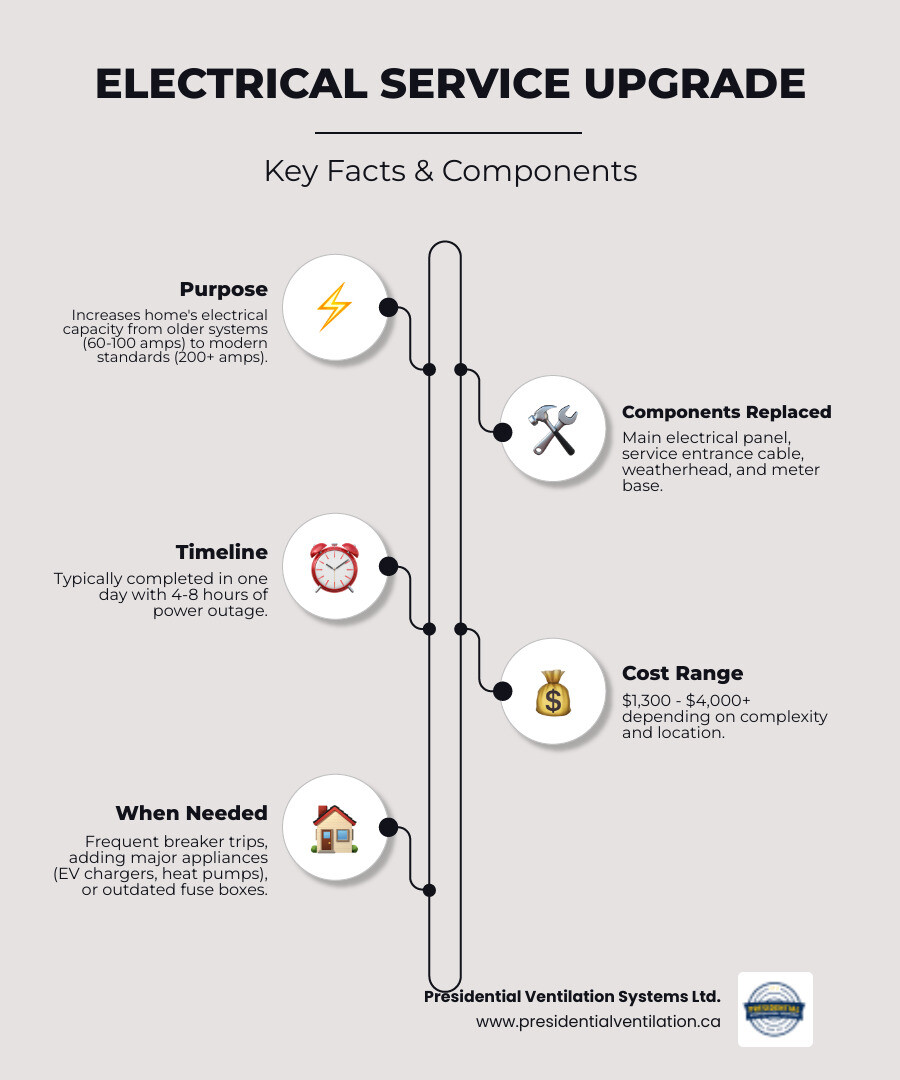
Do your lights dim when you use an appliance? Do you have to unplug the toaster to use the coffee maker without tripping a breaker? Your home might be telling you it's time for an upgrade. Many older homes in Nova Scotia have 60-amp or 100-amp electrical services, which are often insufficient for today's technology.
Look for these common warning signs:
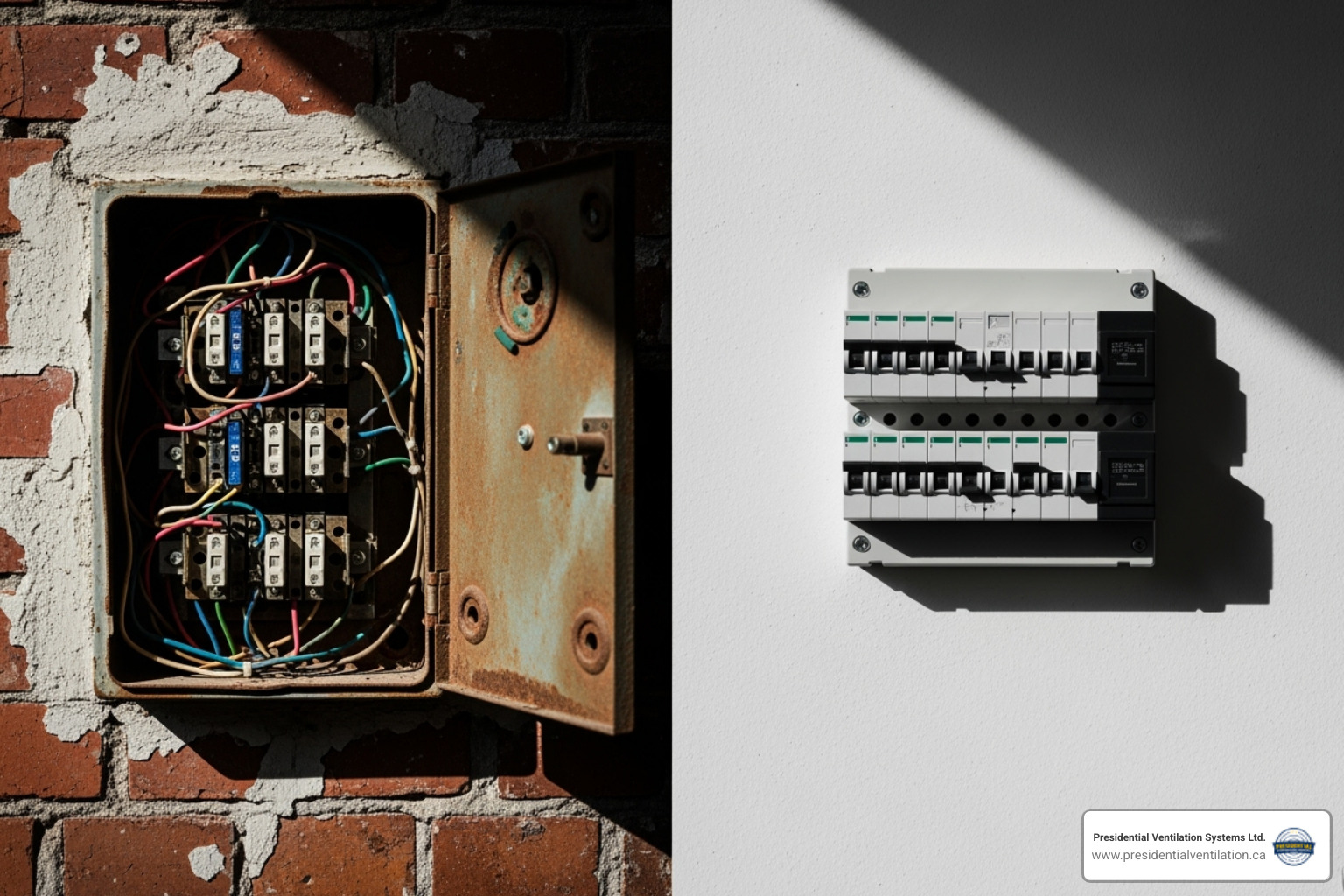
Appliances that often require an upgrade include electric vehicle charging stations, heat pumps, central air conditioners, hot tubs, induction cooktops, and high-powered workshop tools.
Homeowners often use "panel upgrade" and "service upgrade" interchangeably, but they are different projects. The electrical service includes the wires from the utility pole, the meter, and the main cable feeding your panel. The electrical panel is the box that distributes power throughout your home via circuit breakers.
A panel upgrade replaces the breaker box, which can improve safety and add circuits, but it doesn't increase the total power coming into your home. An electrical service upgrade is a larger project that increases your home's total capacity (e.g., from 100 amps to 200 amps) and almost always includes a new panel.
FeatureElectrical Panel UpgradeElectrical Service UpgradeComponents ReplacedElectrical panel (breaker box) and circuit breakersMain service entrance cable, meter base, and often the electrical panelPrimary GoalImprove power distribution, safety, and add circuit spaces within the homeIncrease the total electrical capacity coming into the homeAmperage ImpactUsually keeps the same incoming amperage, but modernizes the distributionIncreases the incoming amperage (e.g., 100A to 200A)Typical ScenariosReplacing an old fuse box, adding more circuits for minor additions, improving safety of existing panelAdding EV chargers, hot tubs, large heat pumps, major renovations, or if current service is insufficient for overall home needsUtility InvolvementMinimal, primarily for inspectionSignificant, requires coordination for power disconnection/reconnection
Understanding what your home needs now and for the future is key. A full service upgrade is often the best long-term solution to avoid having to do more work later.
An electrical service upgrade doesn't have to be overwhelming. At Presidential Ventilation Systems Ltd., we've guided hundreds of Nova Scotia homeowners through this process, making it smooth and stress-free. This section covers the process for a typical 200-amp upgrade, the modern standard for homes.
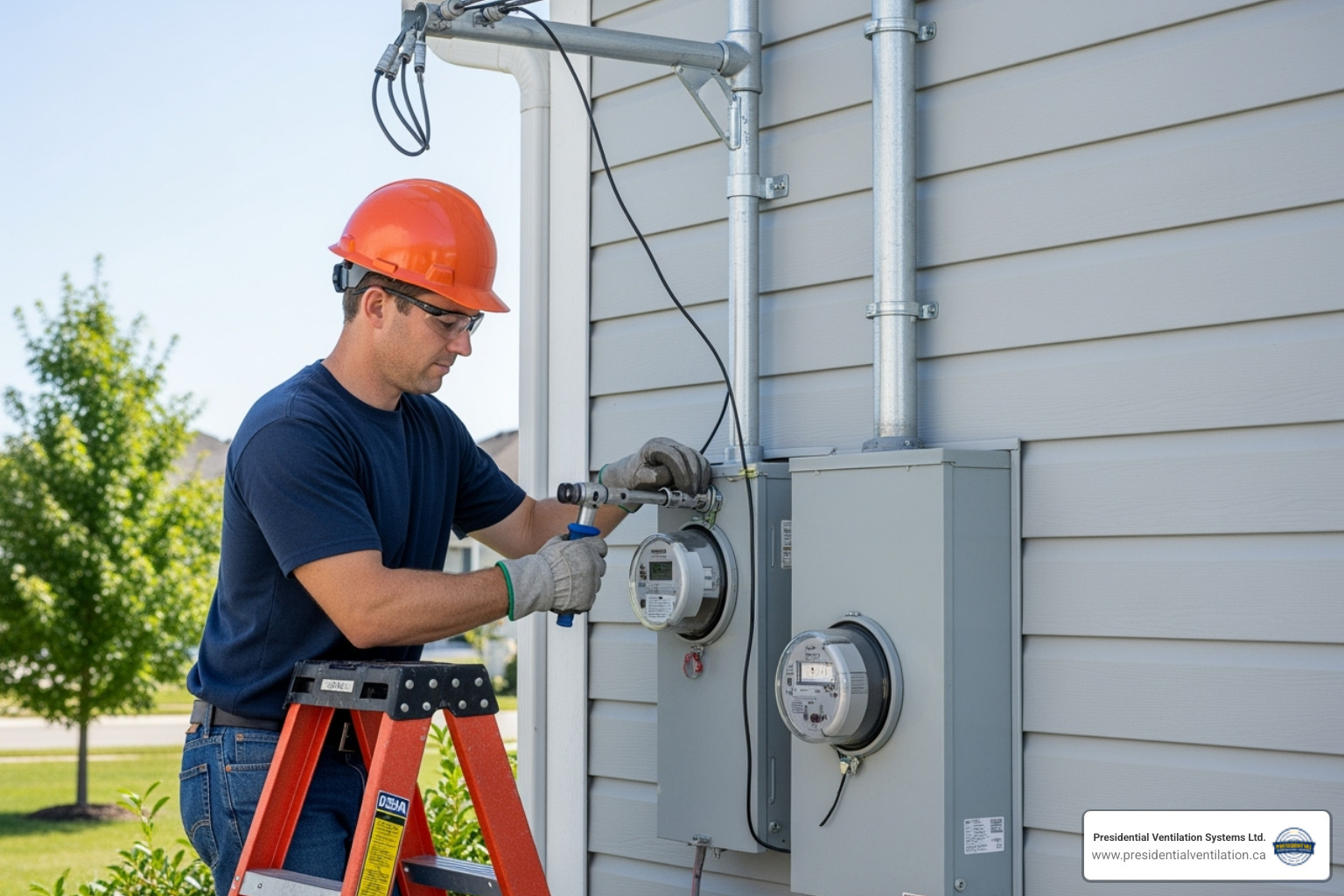
Your electrician handles most of the coordination. Here’s what to expect:
More info about Electrical Services Mount Uniacke
A 200-amp electrical service upgrade typically costs between $1,300 and $4,000, though complex jobs can be more. It's an investment in your home's safety and future.
Key Price Factors:
We provide detailed, transparent quotes so you understand all costs upfront.
More info about Breaker Panel Upgrade Cost
While the physical work is done in one day, the entire process from consultation to completion can take several weeks due to permitting and utility scheduling.
The Power Outage:
Your power will be off for 4 to 8 hours on upgrade day. This is necessary for safety. We coordinate with Nova Scotia Power to minimize downtime.
How to Prepare:
As the homeowner, your main role is to approve the quote and prepare for the outage. We handle the assessment, permits, utility coordination, installation, and inspection. Nova Scotia Power manages the disconnection and reconnection.
Information on the utility's role from Nova Scotia Power
An electrical service upgrade is a strategic investment in your home's safety, value, and functionality for years to come.

The home electrification trend is reshaping how we power our lives. A 200-amp service prepares your home for these changes.
Here are answers to some of the most common questions we receive about electrical service upgrades.
A 200-amp electrical service upgrade typically costs between $1,300 and $5,000. The final price depends on factors like your current amperage, whether you have overhead or underground service, the condition of existing wiring, and the panel's location. At Presidential Ventilation Systems Ltd., we provide a detailed, transparent quote upfront so you know exactly what to expect.
During the upgrade, your home will be without power for about 4 to 8 hours. This planned outage is necessary for our electricians to work safely. We coordinate with Nova Scotia Power to schedule the shutdown and minimize your downtime, and we'll give you plenty of notice to prepare.
No. An electrical service upgrade is complex, dangerous work that should only be performed by a licensed and qualified electrician. This is not a DIY project.
The risks of attempting it yourself include:
Trusting this critical task to certified professionals ensures your family's safety and the integrity of your home's electrical system.
Your home's electrical system is the lifeline that powers your modern world. An electrical service upgrade is a vital step towards ensuring your family's safety, boosting your property's value, and preparing your home for the future. From powering an EV charger to running a high-efficiency Daikin heat pump, a robust 200-amp service provides the foundation for a safe, comfortable, and future-ready home.
For over 30 years, Presidential Ventilation Systems Ltd. has helped homeowners across Nova Scotia, from Kentville to Halifax, Truro to Bridgewater. Our licensed electricians are dedicated to excellence. As a leading Daikin Comfort Pro Dealer, we understand how a reliable electrical supply impacts your home's comfort and efficiency. We are experts in assessing your home's needs and delivering work that meets the highest safety standards.
If you're seeing signs of an outdated system or planning major home improvements, don't let your electrical service hold you back. Reach out to us. We're here to guide you through the process and ensure your home's electrical system is strong, safe, and ready for the future.
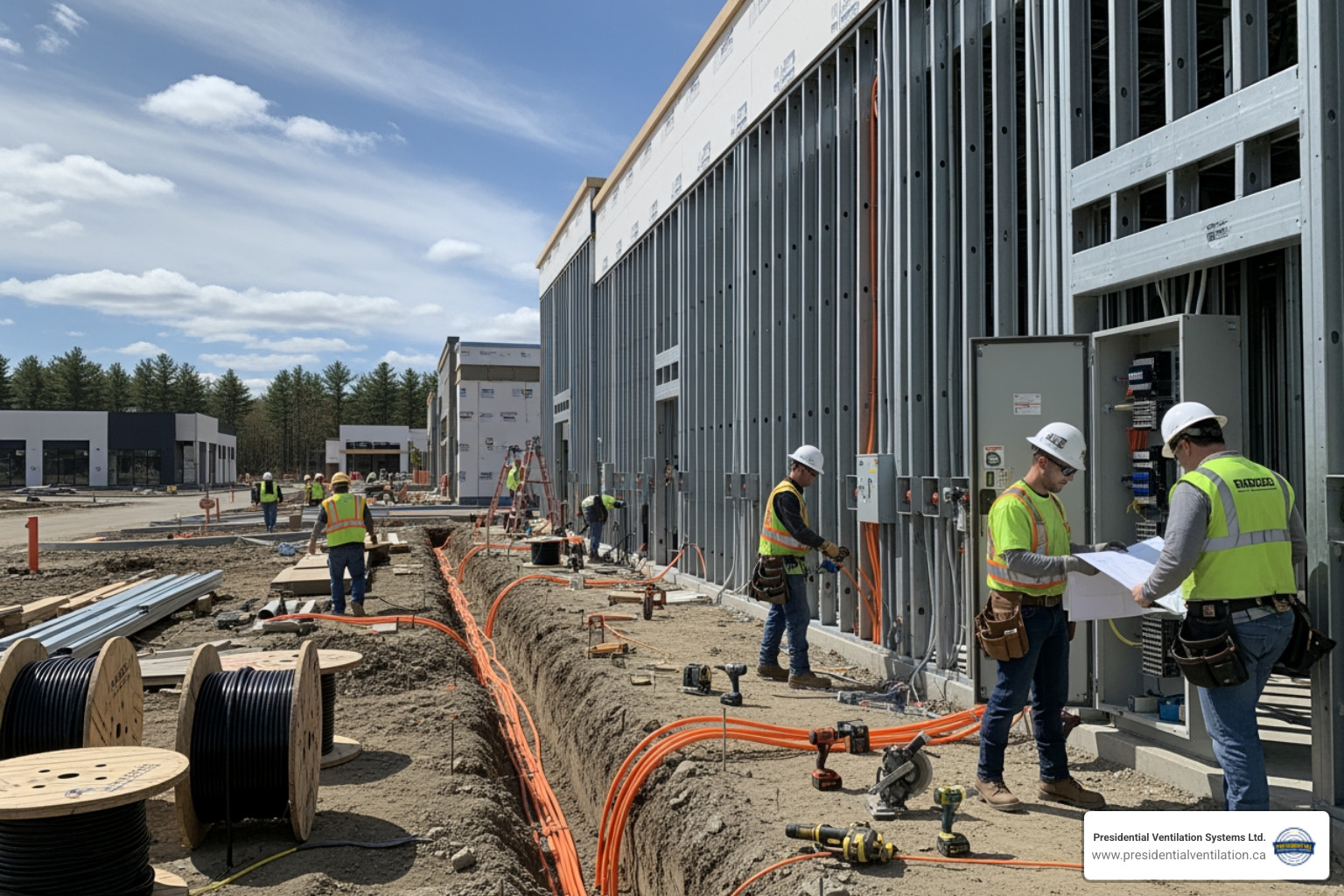


Running a business in commercial electrical in indigo shores, ns requires more than just a great product or service—it demands a reliable, safe, and efficient electrical infrastructure that keeps your operations running smoothly. Whether you're opening a new retail space, expanding an office, or managing a light industrial facility in this growing coastal community, your electrical system is the backbone that powers everything from lighting and computers to specialized equipment and climate control. Without proper electrical planning and maintenance, businesses face costly downtime, safety hazards, and compliance issues that can disrupt growth and profitability.
Quick Answer: Finding Commercial Electrical Services in Indigo Shores, NS
When searching for commercial electrical services in Indigo Shores, look for:
For comprehensive electrical support across Nova Scotia, explore electrical services in Halifax, Bedford, and surrounding areas, or contact Presidential Ventilation Systems for your commercial electrical needs.
This guide walks you through everything Indigo Shores business owners need to know about commercial electrical work—from understanding your facility's unique requirements to choosing the right services, ensuring safety compliance, and future-proofing your electrical infrastructure for long-term success. The coastal location and rapid development in Indigo Shores create specific electrical considerations that smart business owners need to address from day one.
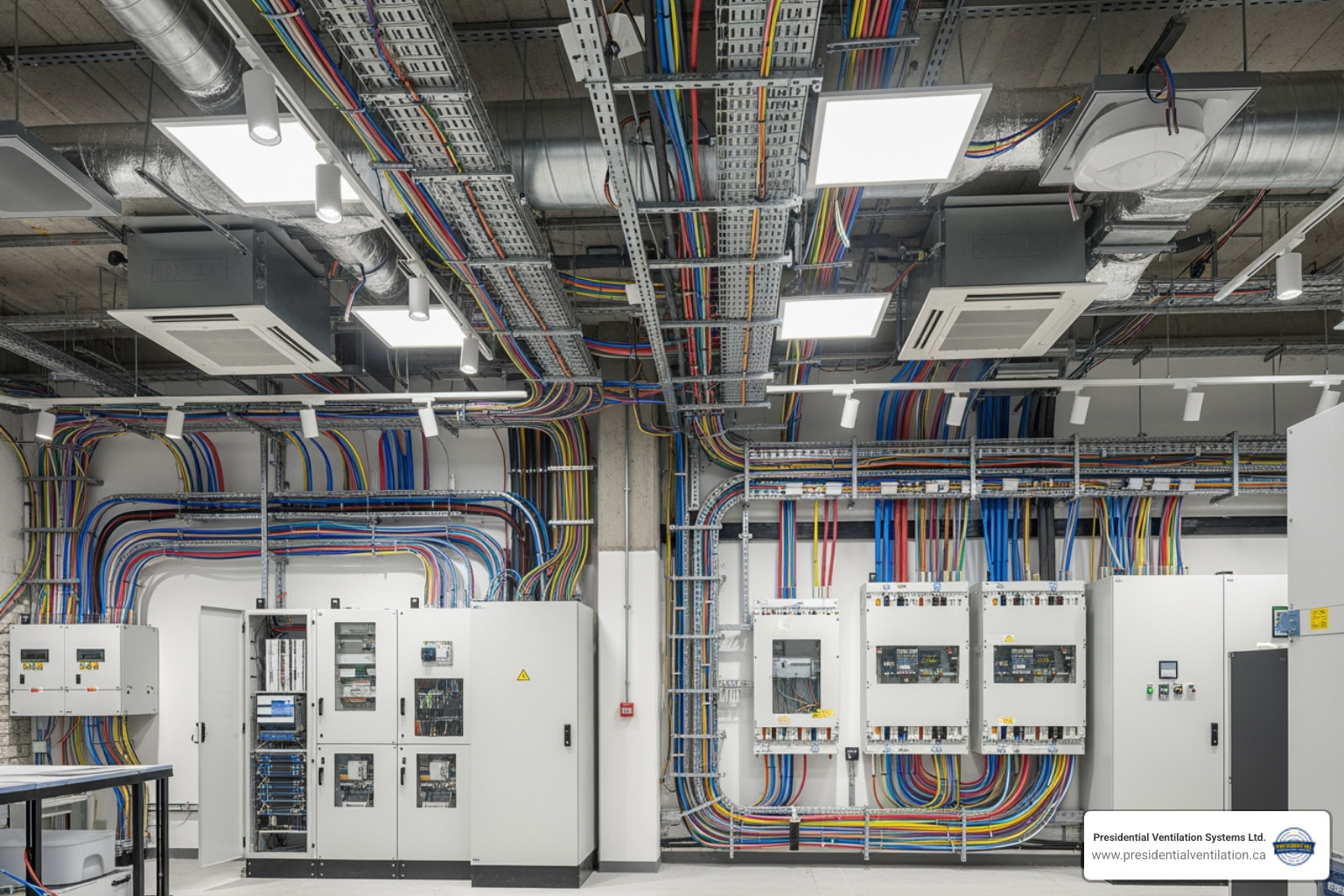
Indigo Shores is a community experiencing dynamic growth, attracting new residents and, consequently, new businesses. This growth means a diverse range of commercial electrical needs, from brand-new construction projects to the sophisticated requirements of modern retail spaces, busy office buildings, and specialized light industrial facilities. Each type of commercial venture has its own set of electrical demands, and understanding these is the first step toward a robust and reliable system.
In Nova Scotia, all electrical work must adhere strictly to the HRM building codes, which are designed to ensure safety and functionality. For businesses in Indigo Shores, this is particularly important as we also contend with the unique challenges presented by our beautiful coastal environment. Salt-laden air and varying weather patterns can impact electrical systems, requiring specialized considerations in installation, maintenance, and even Commercial electrical repairs. A deep understanding of these factors is crucial for any new build or existing setup.
No matter the industry, businesses in Indigo Shores share several core electrical needs that form the foundation of their operations. These include:
While the common requirements apply universally, Indigo Shores presents its own set of unique circumstances that impact commercial electrical planning:
A thriving business in Indigo Shores relies on an electrical system that's not just functional, but also robust, efficient, and adaptable. At Presidential Ventilation Systems, we understand that electrical work goes far beyond simply "making things light up." It's about providing a comprehensive suite of services that support your business's day-to-day operations and long-term goals. From initial setup to ongoing care, our expertise covers every aspect of commercial electrical needs, including new installations, strategic system upgrades, critical panel replacements, proactive preventative maintenance plans, and custom tenant fit-ups. We even assist with related services like Commercial HVAC installation to ensure all your building's essential systems are working in harmony.
When it comes to the electrical infrastructure of your business, quality installation and timely upgrades are paramount. We offer a full spectrum of services designed to power your commercial property effectively:
An ounce of prevention is worth a pound of cure, especially when it comes to your commercial electrical system. Our preventative maintenance plans are designed to keep your operations running smoothly, minimize unexpected downtime, and extend the lifespan of your electrical infrastructure.
Our preventative maintenance tasks typically include:
When it comes to commercial electrical in indigo shores, ns, safety and compliance aren't just buzzwords—they are non-negotiable foundations for any successful business operation. Electrical work inherently carries risks, and without strict adherence to established codes and regulations, businesses face severe hazards, including electrical fires, electrocution, and costly legal ramifications. Ensuring your electrical system is safe and compliant means protecting your employees, customers, property, and ultimately, your business's reputation and financial stability.
In Canada, all electrical installations must conform to the Canadian Electrical Code (CEC), which sets the national standard for electrical safety. Locally, Nova Scotia safety regulations and municipal bylaws, particularly those within the Halifax Regional Municipality (HRM), further define specific requirements for commercial properties. This includes obtaining the necessary municipal permits and undergoing mandatory inspections to ensure all work meets these stringent standards. Partnering with licensed and insured electricians is not just a preference; it's a critical step in safeguarding your workplace, ensuring liability protection, and preventing unforeseen dangers. For instance, businesses in nearby areas like Electrical services Bedford NS also face these same rigorous compliance requirements.
The Canadian Electrical Code (CEC) is a comprehensive set of rules and guidelines designed to ensure the safe installation and maintenance of electrical systems across the country. For commercial electrical work in Indigo Shores, strict adherence to these standards is paramount:
When it comes to your business's electrical system, attempting DIY solutions or hiring uncertified individuals is a risk you simply cannot afford. Professional service for commercial electrical in indigo shores, ns is truly non-negotiable:
In today's competitive landscape, every business is looking for ways to reduce operational costs and improve productivity. For commercial enterprises in Indigo Shores, smart electrical solutions offer a powerful avenue to achieve both. By embracing energy-efficient systems, such as LED lighting retrofits, integrating smart controls and automation, or even preparing for the future with EV charging stations, businesses can significantly lower their utility bills, improve their environmental footprint, and create a more comfortable and productive environment for employees and customers alike. It’s not just about saving money; it's about smart growth and sustainable operations. These electrical upgrades often go hand-in-hand with services like Commercial ventilation solutions, creating a holistic approach to building efficiency.
Investing in energy-efficient electrical upgrades for your Indigo Shores business yields a wide array of benefits that positively impact your bottom line and public image:
The business world is constantly evolving, and your electrical infrastructure should be ready to evolve with it. Future-proofing your business with modern electrical technology ensures you remain competitive and adaptable:
Starting on a commercial electrical project, whether it's a new installation, a significant upgrade, or a comprehensive maintenance plan, can seem like a daunting task. However, with a clear process and a trusted partner, it becomes a streamlined and manageable endeavor. At Presidential Ventilation Systems, we pride ourselves on a transparent and collaborative approach, guiding you through every step from the initial project consultation to the final walkthrough. Our goal is to make your commercial electrical project as smooth and stress-free as possible, ensuring minimal disruption to your daily operations. This structured approach is consistent across all our service areas, including when you're seeking a Commercial electrical Bedford NS guide.
When you decide it's time to address your electrical needs for commercial electrical in indigo shores, ns, here's what you can expect from our straightforward process:
We understand that having work done on your commercial property can be disruptive. That's why we are committed to making the process as seamless and respectful of your business as possible:
As we've explored, a robust, safe, and efficient electrical system is more than just a utility for businesses in commercial electrical in indigo shores, ns—it's a fundamental pillar of success. From understanding the unique demands of our coastal community and adhering to stringent safety codes to embracing energy-efficient solutions and planning for future growth, every aspect of your commercial electrical infrastructure plays a critical role. We’ve seen how essential professional installation, timely upgrades, and proactive maintenance are in ensuring business continuity, protecting your investments, and fostering a productive environment.
Indigo Shores is a community on the rise, and businesses here deserve an electrical foundation that can support their aspirations. At Presidential Ventilation Systems, we are proud to be a part of this growth, offering our expertise and dedication to the local commercial sector. With over 30 years of experience serving Nova Scotia, we bring a wealth of knowledge, a commitment to quality, and an unwavering focus on safety to every project we undertake. We understand the local landscape, the specific regulations, and the unique challenges and opportunities that businesses in Indigo Shores face.
We believe in building lasting relationships with our clients, providing not just services, but solutions that contribute to your long-term success. Our team is ready to ensure your electrical systems are not just up to code, but are also optimized for efficiency, reliability, and the future.
Contact us to discuss your commercial electrical needs in Indigo Shores, NS and let us help power your business to new heights.
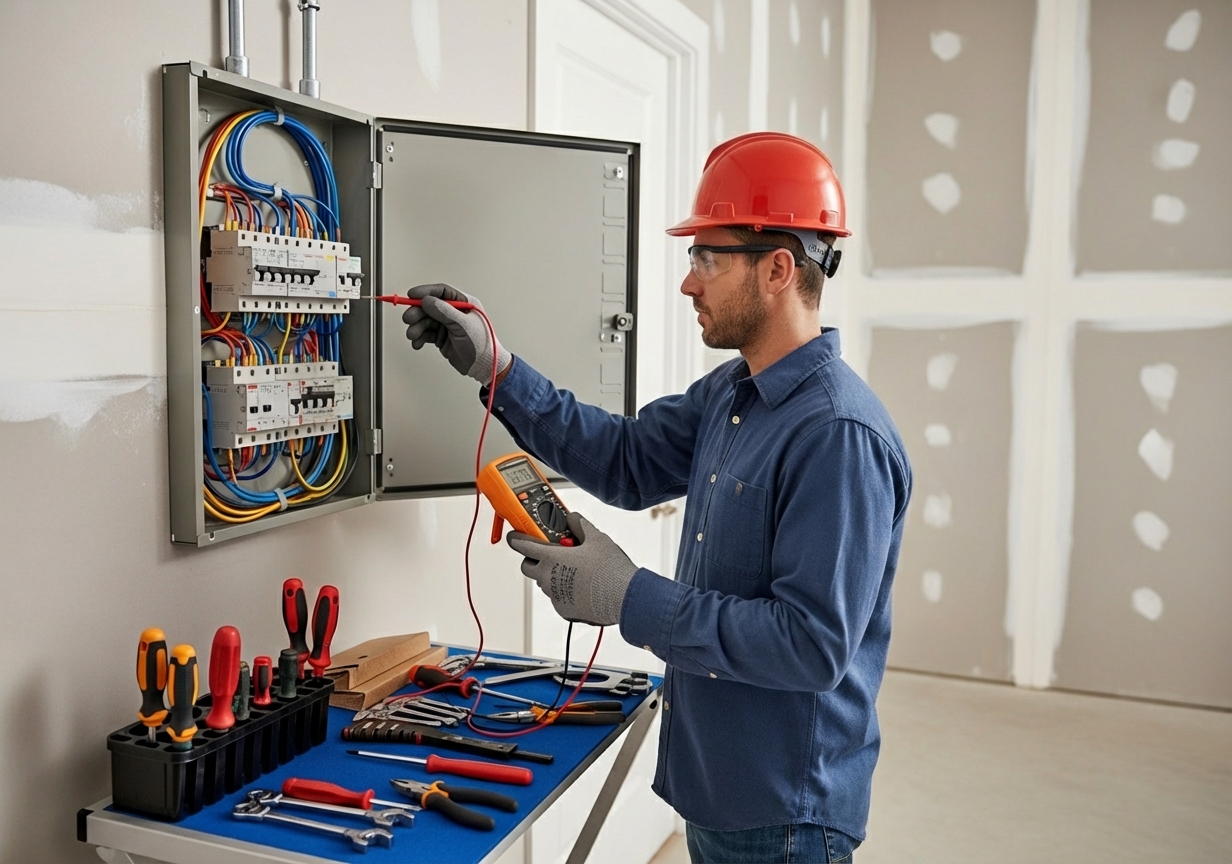


When you need professional electrical in indigo shores, ns, choosing the right experts is crucial for your home's safety and performance. Electrical systems are complex and directly impact your family's well-being and the functionality of your property. From routine maintenance to major installations, trusting licensed and experienced electricians ensures everything meets strict safety standards. This guide will help you understand the essential aspects of electrical services in the Indigo Shores community.
The vibrant community of Indigo Shores, nestled in Nova Scotia, offers a unique blend of natural beauty and modern living. With its growing number of new home constructions and established properties, the demand for reliable and expert electrical services is paramount. We understand that your home is more than just a structure; it's a sanctuary where safety, comfort, and peace of mind are non-negotiable. That's why ensuring your electrical systems are up to code and functioning flawlessly is a top priority.
Electrical safety forms the backbone of a secure home. Faulty wiring, outdated panels, or improper installations can lead to serious hazards, including fires and electrical shocks. By engaging professional electrical in indigo shores, ns, you're not just getting a repair or an installation; you're investing in the long-term safety and stability of your property. Professional standards dictate that all work adheres to the stringent Nova Scotia Electrical Code and other relevant regulations, safeguarding your home and loved ones.
Beyond safety, professional electrical services contribute significantly to your home's value and overall functionality. Modern homes demand sophisticated electrical systems to power everything from smart home devices to energy-efficient appliances. For new home construction, meticulous planning and execution of electrical layouts are essential to meet future needs and improve livability. For existing homes, upgrades and renovations can improve efficiency, increase capacity, and bring your property up to contemporary standards. Our commitment is to provide that peace of mind, knowing that your electrical infrastructure is handled by experienced professionals.
Modern homes and businesses in Indigo Shores require a comprehensive range of electrical services to ensure safety, efficiency, and convenience. As your trusted electrical partners, we offer a full spectrum of solutions designed to meet the diverse needs of our community.
New Construction Wiring: Building a new home is an exciting venture, and the electrical system is its nervous system. Our expert team works closely with builders and homeowners to design and install robust electrical systems from the ground up. This includes everything from initial wiring layouts to final fixture installations, ensuring every outlet, switch, and light source is perfectly placed and safely connected.
Custom Home Projects: For those building bespoke homes, we specialize in tailoring electrical solutions to unique architectural designs and personal preferences. Whether it's intricate lighting schemes, advanced home automation integration, or specialized power requirements, our team ensures your custom home’s electrical system is as unique and sophisticated as your vision.
Renovations & Additions: Expanding or updating your existing home often requires significant electrical work. We seamlessly integrate new wiring and fixtures into your current system, ensuring that additions and renovated spaces are safely powered and meet all current codes. This includes re-wiring older homes to replace outdated systems, which is crucial for safety and efficiency.
Service Panel Upgrades: Many homes, especially older ones, may have electrical panels that are insufficient for today's power demands. Signs like frequent circuit breaker trips, flickering lights, or an outdated fuse box indicate a need for an upgrade. We provide comprehensive service panel upgrades to increase your home's electrical capacity, improve safety, and support modern appliances and technologies.
Lighting Installation: Lighting plays a crucial role in the ambiance, functionality, and security of your home. We offer expert installation of all types of lighting, including indoor pot lights, under-cabinet kitchen lighting, landscape/exterior lighting, and specialized shop/garage lighting. We also offer lighting consultations to help you choose the most energy-efficient and aesthetically pleasing options.
EV Charger Installation: As electric vehicles become more popular, convenient home charging solutions are a must. We provide professional supply and installation of EV chargers, ensuring they are safely and correctly integrated into your home's electrical system. This includes assessing your current electrical capacity and making any necessary upgrades to support the charger.
Generator Backup Systems: Nova Scotia weather can be unpredictable, and power outages are a reality. A reliable generator backup system provides peace of mind, ensuring your home remains powered during outages. We install automated backup generator systems that automatically kick in when the power goes out, keeping essential appliances and systems running.
Pool & Spa Wiring: Installing a new pool or hot tub requires specialized electrical wiring to ensure safety and compliance with strict regulations. Our electricians are experienced in handling the unique electrical demands of aquatic installations, from proper grounding to dedicated circuits, ensuring your recreational areas are safe and enjoyable.
Homeowners are increasingly seeking ways to make their homes more energy-efficient and comfortable. Electrical upgrades play a pivotal role in achieving these goals, and we are at the forefront of providing these solutions to the Indigo Shores community.
Heat Pump Wiring: Heat pumps are an excellent investment for year-round comfort and significant energy savings. They operate by transferring heat rather than generating it, making them highly efficient. Installing a heat pump requires dedicated electrical wiring to ensure it receives the correct power supply and operates optimally. Our electricians are skilled in integrating heat pumps seamlessly into your home's electrical system, ensuring proper breaker sizing and outdoor disconnect switches. Modern cold-climate heat pumps can operate efficiently even at temperatures well below freezing, offering a reliable heating solution for Halifax winters. For those looking to make the switch, programs like the Oil to Heat Pump Affordability (OHPA) Program offer significant funding. We encourage you to learn more at the official OHPA Program page to explore potential benefits.
Smart Home Automation: Transform your home into a smart, responsive environment with our smart home automation services. From automated lighting and climate control to integrated security systems, we can wire and install the necessary infrastructure to bring your smart home vision to life. These systems not only improve convenience but can also contribute to energy savings by optimizing energy usage.
Energy-Efficient Lighting: Upgrading to energy-efficient lighting, such as LED fixtures, can drastically reduce your energy consumption and electricity bills. We offer consultations and installations for various energy-saving lighting solutions, helping you brighten your home while minimizing your environmental footprint. Beyond just lighting, we also provide energy-saving consultations and energy-efficient lighting upgrades as part of our commitment to sustainability.
Furthermore, you might also qualify for an interest-free loan for additional home upgrades. You can check your eligibility for the Canada Greener Homes Loan to see how you can further invest in your home's energy efficiency. Our goal is to help you achieve a home that is not only safe and functional but also a model of modern energy efficiency and comfort.
When it comes to your home's electrical system, you should never compromise on quality or expertise. Choosing the right electrical professional for your needs in Indigo Shores is a decision that impacts your safety, finances, and peace of mind. Here are the key criteria we believe are essential when selecting an electrician.
Licensed & Insured: This is non-negotiable. A licensed electrician has demonstrated the necessary knowledge and skills to perform electrical work safely and competently, adhering to provincial standards. Insurance protects you from liability in case of accidents or damage during the project. We are fully licensed and insured, providing you with complete peace of mind.
Red Seal Certification: The Red Seal endorsement signifies a high standard of excellence in the skilled trades across Canada. A Red Seal certified electrician has met rigorous national standards and possesses a comprehensive understanding of their craft. This certification is a strong indicator of an electrician's expertise and commitment to their profession. Red Seal Certified refrigeration mechanics, for example, are qualified to service heat pumps, demonstrating the high level of training involved.
Adherence to Codes: Electrical work must strictly comply with the Nova Scotia Electrical Code and other local building regulations. A qualified electrician will be intimately familiar with these codes and ensure all installations and repairs meet or exceed these requirements. This not only guarantees safety but also ensures your work passes inspections and maintains your property's insurability.
Local Experience: Electricians with experience working in the Indigo Shores area and broader Nova Scotia region will have a better understanding of local challenges, such as coastal environmental factors and common building practices. Their familiarity with local suppliers and permitting processes can also streamline your project.
Upfront Communication: Clear and honest communication from the outset is a hallmark of a professional service. This includes providing detailed explanations of the work to be done, transparent processes, and answering all your questions. We believe in providing expert advice and keeping our clients informed every step of the way.
Written Warranties: A reputable electrician stands behind their work. A written warranty on services provides assurance that if any issues arise after the job is complete, they will be addressed promptly and professionally. We offer strong warranties on our services, reflecting our confidence in the quality of our workmanship.
Electrical work in Nova Scotia is governed by a robust framework of regulations designed to ensure safety and quality. For anyone undertaking electrical projects in Indigo Shores, understanding these regulations is crucial.
The Nova Scotia Electrical Code is the cornerstone of electrical safety standards in the province. This code outlines the requirements for electrical installations, ensuring that wiring, equipment, and practices meet specific safety benchmarks. All electrical work, whether for new construction, renovations, or repairs, must strictly adhere to these guidelines.
The Electrical Installation and Inspection Act is the provincial legislation that mandates adherence to the Nova Scotia Electrical Code and establishes the framework for electrical inspections. This Act ensures that all electrical installations are performed by qualified individuals and are subject to inspection by authorized personnel. This provides an additional layer of protection for homeowners and ensures that all work is up to standard.
The permitting process is an integral part of ensuring electrical safety. Before any significant electrical work begins, a permit must be obtained from the relevant authority. This permit signals that the planned work will be inspected to ensure compliance with the electrical code. Our professional electricians handle the permitting process for you, ensuring all necessary approvals are secured before work commences.
Safety inspections are carried out by certified electrical inspectors at various stages of a project. These inspections verify that the electrical installation meets all code requirements, from rough-in wiring to final connections. Passing these inspections is mandatory for the electrical system to be legally energized and deemed safe.
Code-compliant work is not just about following rules; it's about safeguarding your property and the people within it. By adhering to these regulations, we ensure that every electrical service we provide in Indigo Shores is performed to the highest standards of safety and quality.
Attempting electrical work without the proper training, tools, and understanding of safety protocols can have severe and lasting consequences. While a DIY approach might seem like a cost-saving measure, the risks far outweigh any potential benefits, especially when it comes to professional electrical in indigo shores, ns.
Safety Risks of DIY: Electrical systems are inherently dangerous. Working with live wires, incorrectly installing components, or misinterpreting wiring diagrams can lead to immediate and serious safety hazards. These risks include:
The complexities of modern electrical systems demand the expertise of trained professionals. Here's why attempting DIY electrical work is rarely a good idea:
Complex Systems: Today's homes feature intricate electrical networks that include various circuits, specialized wiring for high-demand appliances, and integrated smart home technologies. Understanding these complex systems requires extensive training and experience.
Specialized Tools: Professional electricians use a range of specialized tools and testing equipment for accurate diagnosis, safe installation, and proper calibration. These tools are often expensive and require specific training to use effectively, making them impractical for the average homeowner.
Diagnostic Expertise: When an electrical issue arises, identifying the root cause can be challenging. Professional electricians possess diagnostic expertise to quickly and accurately pinpoint problems, preventing guesswork that can lead to further damage or unsafe conditions.
Warranty Protection: Professional electrical services typically come with a warranty on both parts and labor. This provides an important layer of protection and assurance that the work will be done correctly and any post-installation issues will be addressed. DIY work, by contrast, offers no such protection.
Code Violations: Electrical codes are constantly updated to reflect new technologies and safety standards. Without an in-depth understanding of these codes, DIY electrical work is highly likely to result in violations. Code violations can lead to failed inspections, fines, and the necessity of hiring a professional to correct the work, often at a higher cost.
For these reasons, entrusting your electrical needs to us ensures that your home in Indigo Shores benefits from safe, compliant, and reliable electrical solutions.
Just like any other critical system in your home, your electrical infrastructure benefits immensely from regular preventative maintenance. This proactive approach helps to identify potential issues before they escalate into costly repairs or safety hazards, ensuring the long-term reliability of your professional electrical in indigo shores, ns.
Annual Inspections: We recommend annual electrical inspections for all homes. During these inspections, our qualified electricians thoroughly examine your entire electrical system, from the service panel to outlets and fixtures. This allows us to detect signs of wear and tear, loose connections, or potential code violations that might otherwise go unnoticed. Regular inspections can uncover issues like outdated wiring or overloaded circuits, which are crucial for maintaining safety.
Panel Check-ups: Your electrical panel is the heart of your home's electrical system. Regular check-ups ensure that all breakers are functioning correctly, connections are tight, and there are no signs of overheating or corrosion. This is especially important for older panels that may not be designed to handle the demands of modern appliances.
Smoke & CO Detector Testing: While not strictly an "electrical system" check, ensuring your smoke and carbon monoxide (CO) detectors are fully functional is a critical part of home electrical safety. We can test these devices, replace batteries, and advise on optimal placement to provide maximum protection for your family.
Outlet and Switch Checks: Over time, outlets and switches can become loose, worn, or damaged. During maintenance, we inspect all outlets and switches for proper function, secure connections, and signs of damage. This includes checking ground-fault circuit interrupters (GFCIs) in bathrooms and kitchens, and arc-fault circuit interrupters (AFCIs) in bedrooms, which are essential safety devices.
Surge Protection: With the increasing number of sensitive electronics in our homes, surge protection is more important than ever. We can assess your home's current surge protection, whether at the panel or point-of-use, and recommend upgrades to safeguard your valuable appliances and devices from power surges, which can be particularly relevant in coastal areas prone to storms.
By investing in preventative electrical maintenance, you're not just extending the lifespan of your electrical system; you're actively contributing to the safety and efficiency of your Indigo Shores home.
We understand that homeowners often have questions about their electrical systems. Here are answers to some of the most common inquiries we receive regarding electrical work, particularly relevant for properties in Indigo Shores.
An electrical panel is a critical component of your home's electrical system, distributing power safely throughout your property. Several signs indicate that your home might benefit from an upgrade:
If you notice any of these signs, we recommend contacting us for an inspection. We can assess your current system and advise on whether an upgrade is needed.
Properties in coastal areas like Indigo Shores face unique environmental challenges that impact electrical systems. Special considerations are necessary to ensure safety, durability, and long-term performance:
Addressing these considerations with professional expertise ensures your coastal property's electrical system is resilient and safe.
Wiring for a new heat pump is a specialized task that requires careful planning and execution to ensure efficient and safe operation. Here’s what's typically involved:
Proper heat pump wiring is essential for the unit's performance, safety, and longevity, contributing significantly to your home's energy efficiency and comfort.
When it comes to the safety and functionality of your home or business in Indigo Shores, you deserve nothing less than the best. At Presidential Ventilation Systems Ltd., we are dedicated to providing exceptional professional electrical in indigo shores, ns. With over 30 years' experience, we have built a reputation for quality workmanship, transparent communication, and unwavering commitment to customer satisfaction.
Our team of Red Seal certified electricians brings unparalleled expertise to every project, whether it's a new construction, a complex renovation, or a critical service upgrade. We understand the unique demands of the Indigo Shores community, from the challenges of coastal environments to the specific needs of modern, energy-efficient homes. Your home safety is our paramount concern, and we ensure every electrical installation and repair adheres to the highest industry standards and Nova Scotia's stringent electrical codes.
We pride ourselves on offering comprehensive solutions, from essential wiring and panel upgrades to advanced smart home integrations and EV charger installations. Our goal is to improve your comfort, improve your home's energy efficiency, and provide you with lasting peace of mind. When you choose us, you're choosing a partner who values your trust and delivers reliable, high-quality electrical services designed to stand the test of time.
For all your electrical needs, find the difference that professional expertise and dedicated service can make. We invite you to Learn more about our electrical services in Indigo Shores, NS and let us illuminate your home with safety, efficiency, and comfort.